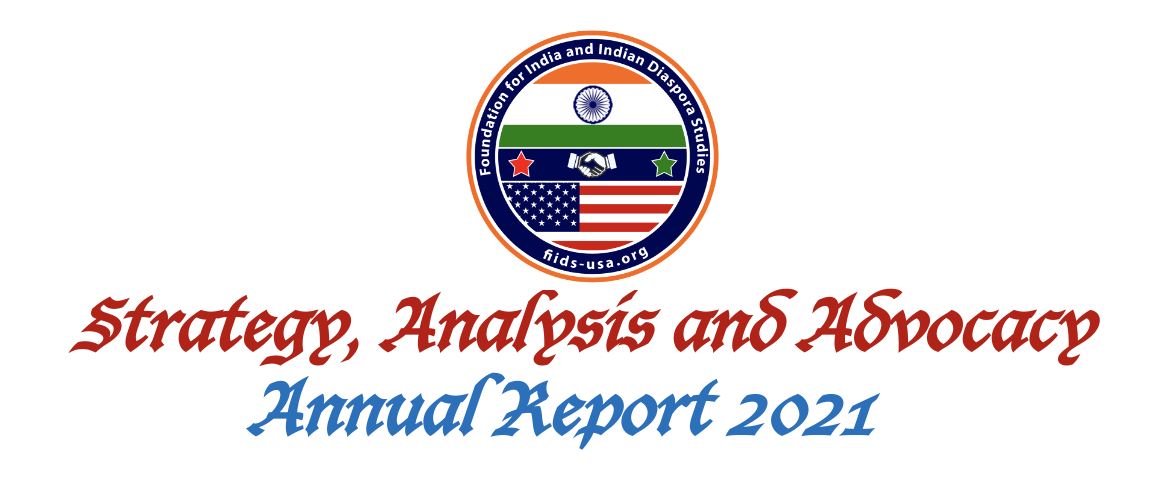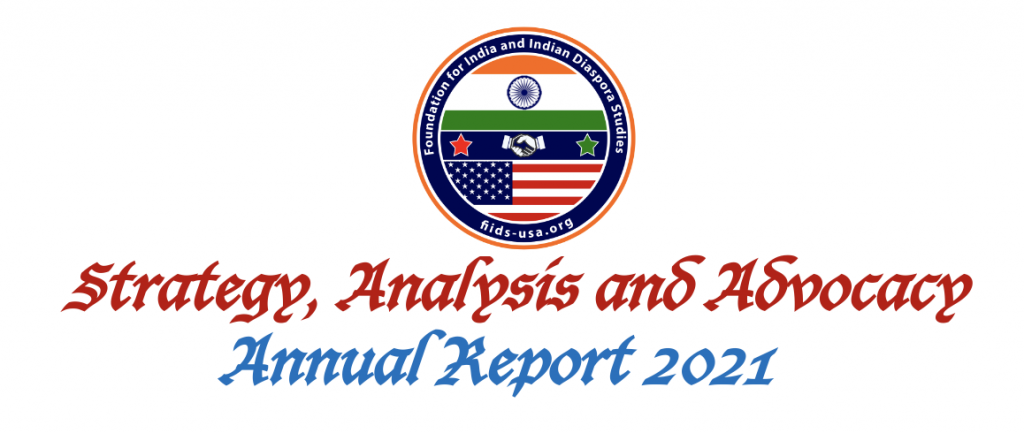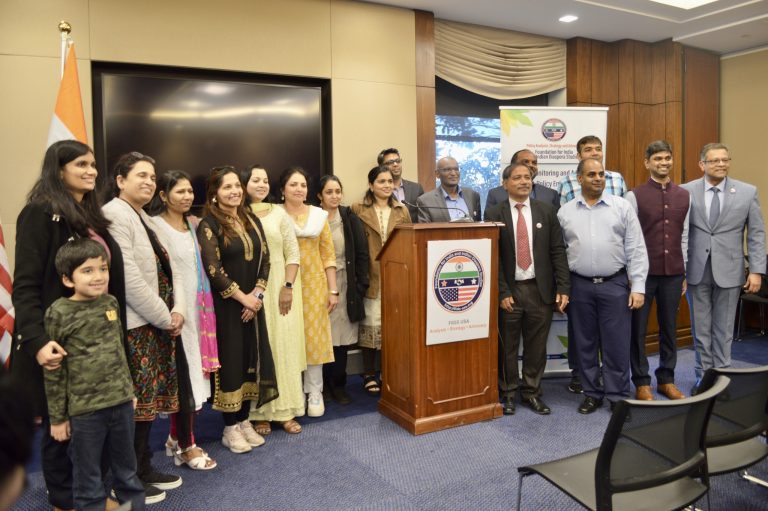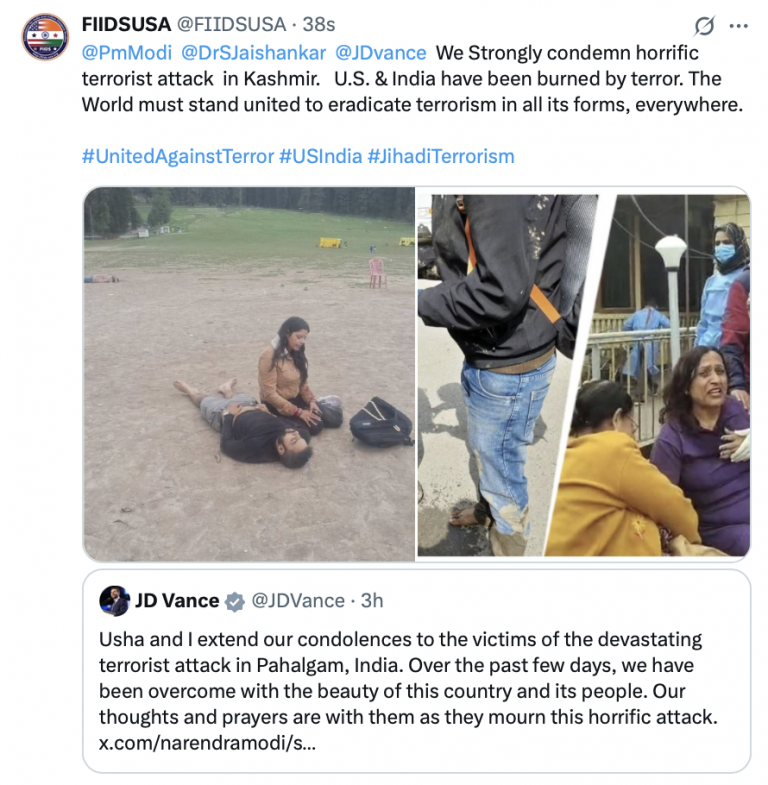

2021 Annual Report
Foundation for India and Indian Diaspora Studies (FIIDS)
Analysis, Strategy, and Advocacy for Narratives and Global Perception building related India and Indian Diaspora
http://www.fiids-usa.org/annual-report-2021/
Donate: http://fiids-usa.org/donate
Donations are 501 C 3 Tax Exempt

Foundation for India and Indian Diaspora(FIIDS) works on strategy, policy as well as advocacy building narrative towards global perception on matters related to US-India, India, and Indian Diaspora. We would like to present the annual report of 2021 and appeal for your support in terms of advice, influencing elected officials, resources and funding for 2022.
During this challenging second year of the pandemic, FIIDS continued its activities both virtually as well as in-person. We continued conferences, expert dialogues, and awareness programs on issues related to US-India relations, India, and the Indian diaspora. During the year, we conducted panel discussions, surveys, policy analysis, published position papers, and engaged with experts and elected officials. Among others, these were our primary initiatives:
Key Highlights of 2021:
US-India Relations: As the Biden administration inaugurated in January 2021, FIIDS hosted a panel discussion on what to expect from the administration and what are the expectations from India and Indian-diaspora. Professor Walter Andersen (John Hopkins University, DC) and Captain Alok Bansal (India Foundation, Delhi) participated in this panel. Professor Andersen anticipated a continuation of strategic initiatives in foreign affairs relating to South Asia and China, but in a more sophisticated way. Captain Bansal expressed a need to retain a small military presence in Afghanistan to enforce a peaceful transition. Subsequently, FIIDS surveyed Indo-Americans and activists on their opinions and expectations from the current administration. We found 21% responders expressed human rights violations and sponsorship of terrorism by Pakistan as the top concern, and 16% expressed aggressiveness of China and its handling as their top concern. Strengthening of US-India relations, respecting sovereignty of India on its internal matters and tech immigration in the USA were top preferences from 10%(each) responders. Based on their inputs and experts’ guidance, FIIDS presented a position paper expressing policies on South Asia, India Pacific, trade, and high-tech immigration in a panel discussion with Ambassador Pradeep Kapoor (University of Maryland) and Rishi Kumar (Democratic leader from California).
Panel on expectations from the Biden Administration: http://www.fiids-usa.org/panel-indo-us-relations-feb2021/
Survey: http://www.fiids-usa.org/indo-american-survey-by-fiids-recommendations-for-biden-administration/
Panel on Recommendations for the Biden Administration: http://www.fiids-usa.org/indo-american-policy-recommendations-for-biden-administration/
The impact of US withdrawal from Afghanistan: As the Taliban took over Kabul on August 15, FIIDS hosted a panel of experts on August 21 to discuss the global impact of Afghanistan’s takeover. During his presentation, Captain Bansal expressed that the lack of political leadership and abandonment by military commanders resulted in the resistance-less takeover of Afghanistan. He mentioned the feeling of betrayal by the US among the local population as well as NATO leadership. He warned that the vacuum of withdrawal will be filled by opportunistic China and conspiring Pakistan. He further explained that the Taliban would try to maintain short-term peace in order to gain international acceptance and stability. However, the situation in Afghanistan will become more radical in the long-term and it would become a problem for Europe, the US and India. http://www.fiids-usa.org/causes-and-global-impact-of-talibans-takeover-of-afghanistan/ We subsequently engaged Afghan Americans as well as elected officials to create awareness regarding the dangers of this takeover on human rights.
Awareness on Issues, Events, and Policy Matters of India: In November 2020, the agitations against India’s Farm Bills were launched by farmers, primarily from three states: Punjab, Haryana, and Western-Uttar Pradesh, out of 28 states and 8 union territories. In December 2020, we hosted a talk by BJP’s Economic Advisor, Gopal Krishna Agarwal. In February, we published a position paper on the benefits of the Farm Bills. We educated community leaders, the media as well as elected officials. Upon observing radicalization of a small section of Punjabi Indian-diaspora, we hosted an analysis from Sukhi Chahal (Founder of Khalsa Today) on March 10th on the farmers’ protests. Subsequently, we also create awareness of radicalization and separatism being promoted in the United States and Canada under the pretext of protests.
Position Paper http://www.fiids-usa.org/india-farm-bills-and-protests/
Bangladesh and Genocide 1971: Minorities in Bangladesh have been subjected to discrimination, persucation, and genocide from 1947. This resulted in the reduction of the minority (mainly Hindu) population, from 33% in 1947 to less than 8% in 2020. During this period hundreds of thousands of minorities were killed and raped and around 9 million took refuge in India. In October of 2021 during Durga Puja, a Hindu festival worshipping the feminine form of God, Hindu temples were destroyed, festivities were disrupted, Hindus were beaten, hundreds were injured, and dozens died in attacks. FIIDS hosted a panel of Priya Saha, Bangladesh Human rights activist, and Utsav Chakravarty, Bengali-speaking Indo-American political analyst. Subsequently, we published action recommendations for the Bangladesh government, US government, Indian government, and corporations who import clothes from India, such as Walmart and GAP. We continue to raise awareness about the atrocities and the Genocide of 1971 among the elected officials.
Panel:
http://www.fiids-usa.org/panel-atrocities-on-hindus-in-bangladesh/
Position Paper:
http://www.fiids-usa.org/actions-needed-on-atrocities-on-hindu-minorities-in-bangladesh/
Fairness for High-Skilled Immigrants Act HR.1044: During 2020, FIIDS continued to monitor and campaign towards legislation and policies related to skilled/tech workers. We create awareness on this issue among the elected officials http://www.fiids-usa.org/fiids-report-pemanent-residency/. We will work on shifting the perception of India professionals from job-takers to job-givers.
Think Tanks Interactions: In 2021, we engaged in discussions relating to US-India issues with experts from the Heritage Foundation, Carnegie Endowment For International Peace, John Hopkins University, Asia Society, Atlantic Council, Stimson Institute, Washington Institute, Gold Institute, and Observer Research Foundation in Washington DC.
Inter Community Outreach: We continue to engage Afghan Americans, Jewish American, Yezidi, and Bangladeshi minorities in Washington DC, California, and Arizona.
Indo-American Capacity Building: In 2020-21, we observed intense campaigns of misinformation against India on issues such CAA, NRC and Article 370, as well as H1/B and Green Card issues that Indian immigrants are facing. It is important to set proper narratives and establish appropriate perception on matters relating to US-India relations, India, and Indian diasporas. Hence, FIIDS decided to host workshops to build the skills and ability in community leaders, activists, and like-minded organizations to set narratives and cultivate influence. These workshops are designed to strategically and systematically create awareness about these issues among elected officials, think tanks, and the media. This year we hosted two workshops: (a) Civic Engagement: Yogi Chugh (CA-political activists) and Jay Kansara (Former Director Government Relations, Washington DC) (b) Social Media Management: Amit Malviya, Social Media Campaign Expert.FIIDS 2021 Internship Program: This year seven high-schoolers registered for the internship program.
FIIDS 2021 Internship Program: This year seven high-schoolers registered for the internship program.






